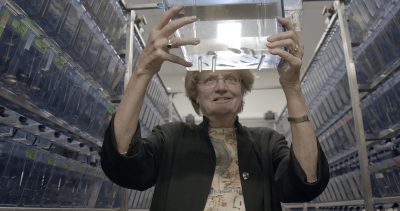Despite recent social movements to promote gender equality and combat sexual harassment — including the #MeToo movement and the fight for equal pay — women in the sciences say they still face such obstacles in their work.

Boston University scientists and Wheelock College of Education and Human Development professionals gathered for a moderated discussion Tuesday to reflect on the documentary film “Picture a Scientist” and their own experiences with gender and race-based discrimination in the industry.
“Picture a Scientist” — which streamed on PBS NOVA April 14 — is a feature film directed by Ian Cheney and Sharon Shattuck that premiered last year. The documentary follows chemist Raychelle Burks, biologist Nancy Hopkins and geologist Jane Willenbring as they discuss their experiences in the field.
From subtle sexism to harassment, the women in the film discuss discriminatory experiences many femme-presenting persons experience in the workplace.
BU’s virtual film screening was made available through Wheelock over the long weekend. At the following discussion four panelists, an anchor and two moderators reflected on how the film illuminates struggles women and people of color face in STEM and responds to issues brought up in the film.
“We hope that this panel can serve as a starting point for discussions at BU and beyond,” moderator Melisa Osborne said at the event, “and that these discussions can lead to action and change in scientific culture at the institutional level.”
Marisol Dothard, a Ph.D. student in the Graduate School of Arts and Sciences at BU, said at the event the film highlighted the struggles that women in science face even at the height of their careers and how their efforts to combat sexism make the work easier for the next generation.
“I was just really, really impressed by how even at the top you have so much to fear still as a woman,” Dothard said. “I really liked in the movie how they had the aspect of the younger generation … that didn’t realize how much stuff women even before them had to go through.”
Felicity Crawford, clinical associate professor of special education at Wheelock, said she realized after she watched the film how much responsibility rests on women in STEM to address the sexism within the field.
At the discussion, Crawford said what was particularly moving about the film was how Hopkins, who started working at Massachusetts Institute of Technology in 1973, described working after hours “in the dark … alone and in secrecy” to collect data to prove female employees were given less space than their male counterparts.
“Why is it that the victims are still the ones carrying the burden of addressing the problem of sexism, while bearing the consequences of victimization?” Crawford said at the event, “and why is this the case when the problem did not and does not originate with them?”
Panel moderators Osborne, a laboratory manager and research scientist at the Segrè Lab at BU, and Barkha Shah, a laboratory supervisor in the biology department at BU, said the discussion was designed to create space for women in STEM fields to share what they face in their work.
“I think that really does help build community, but I also think it helps build a bit of a women in science support network,” Osborne said in an interview. “It’s so nice to know that other people understand how difficult certain aspects have been or can be in trying to pursue a career in higher academic science.”
In an interview, Shah said the students working and learning in the labs she oversees are more aware of the pervasive issue of sexism than students of the past, which she attributes to institutional efforts to address complaints of harassment and discrimination.
“I think that in the past things were hush-hush,” Shah said. “Nowadays, I think it’s much more common to be more outspoken about it because the institutions are saying ‘we want to hear from you.’”
To continue the conversation around women in the sciences, a second panel is in the works for the summer, Osborne and Shah said.
“Even if there’s just one student who maybe came to the panel … who wants to get help, then it’s all worth it, right?” Shah said. “Just let students know that there are people here who care about them and who want to hear what they have to say.”























































































































